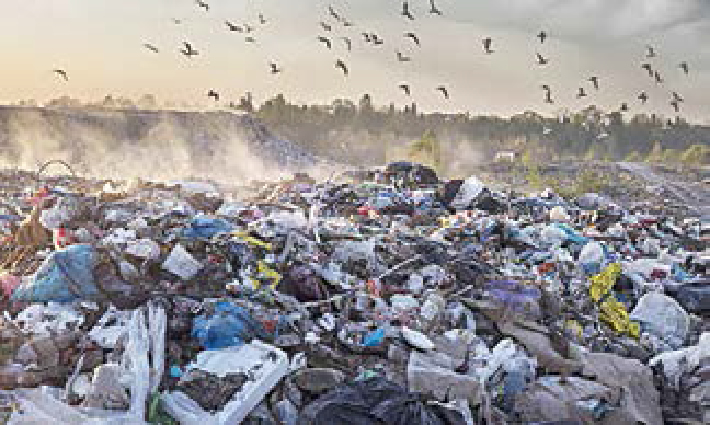
Nigeria has yet to be at par with the most environmentally friendly practices for its waste disposal system. Yet, it is one of the largest producers of waste in Africa.
A recent United Nations Industrial Development Organisation report stated that Nigeria generated 32 million tonnes of waste annually. Of this figure, 2.5 million tonnes accounted for plastic waste and e-waste, 461,300 tonnes.
Undoubtedly, the improper management of waste had caused an increase in sanitation-related diseases and flood disasters.
In 2018, a platform specialising in market and consumer data, Statista, reported a 59 per cent informal management and disposal of waste with about four per cent of the government’s intervention in the waste disposal system. This data further revealed that individuals and communities had devised means to dispose of their wastes in most states, with little intervention or policies from the government.
Several studies have also affirmed that waste burial, open-air burning and dumping were the commonly practised waste disposal systems.
This uncontrolled and indiscriminate dumping of refuse has caused a dirty and littered environment including stench from open dumpsites and smoke from haphazard burning of refuse. These practices consequently contributed to the environmental crisis the country faced.
The adverse effects of improper waste disposal include air, soil and water contamination and the spread of airborne diseases which affect humans and animals.
Data from World Economics placed Nigeria’s Environmental Air-Quality value as 61.7PM 2.5. This value placed Nigeria as 14th out of 124 global listings of countries with the worst air quality.
A recent report by Clean Up Nigeria, titled, “State of the Nigerian Environment 2022,’’ stated that only three states namely Lagos, Oyo, Abuja and Bauchi operated sanitary landfills while other states practised open dumping.
A sanitary landfill is a safe method of waste disposal where a pit with a protected bottom is dug for trash to be deposited, buried in layers and compressed to make it more solid. The report inferred that this unhealthy system affected the health of sanitation workers and other members of society.
The National Coordinator, Clean Up Nigeria, Ene Owoh, in a statement said, “This development is not only alarming but indicates a lack of seriousness by the government at all levels to key into the global best practices of waste modernisation with related benefits. Only four cities namely, Abuja, Uyo, Bauchi and Abakaliki can be said to be clean in the year 2022.
“Performance indicators from our studies show that over 176.3 million Nigerians in 2022 are living in an unclean environment, compared to 172 million in 2021. This equally calls for serious incremental review on the part of governments at all levels to help confront the challenges of ensuring a cleaner and safer environment.”
Other safe methods of waste disposal include plasma gasification, incineration, waste compaction, biogas generation, composting and vermicomposting among others. Some environmentalists have called for a nationwide practice of proper waste management.
In his contribution, Dean of Environmental Engineering at the University of Abuja, Prof Toochukwu Ogwueleka, urged state governments to ensure proper waste management in the country. Ogwueleka stated that no state in Nigeria had a sanitary landfill. He added that states that had sanitary landfills had converted them into open dumping due to poor maintenance.
The don further noted that the significant issue with waste management in the country was the lack of manpower, highlighting the need for capacity building in the sector. He said, “Sanitary landfill must have geotextile material underneath which prevents leaching of chemical wastes from the dump to groundwater. It must also have a vent for gas recovery. There is no provision for gas recovery or leaching in the dump sites we have in the country. What we call sanitary landfills in Nigeria is far from it, it is an open dump.”
The dean opined that state governments should develop capacity in the waste management agencies rather than focus on sanitary landfills which he termed the last resort in waste management.
He further said that poor investment in waste management, waste composition and generation analysis, transportation management, and unnecessary importation of waste equipment increased improper waste disposal schemes.
He added that transportation accounts for nearly 70 per cent of waste management cost, adding that if properly managed and reduced, it would reduce the cost of waste management.
Ogwueleka said, “We need to look inwards, using local means to solve the waste issue in Nigeria. Most of the equipment imported to tackle waste is unnecessary. For instance, in composition, Nigeria has more organic dense waste than volume compared to the developed world where you find more plastic waste. Some of the equipment they use in waste management cannot directly work for us.
“Compactor trucks are better for voluminous waste but that’s what most of our governors buy, without adequate knowledge of the composition or volume of waste generated in the state or an area. Our waste is already dense, what we need is to find local solutions to local problems. Optimising and scheduling routes for transporting wastes, using adequate truck size after carrying out appropriate waste generation analysis will curb the issues we face with waste.”
On global best practices, he called for the incorporation of an integrated waste management system with an emphasis on reduction, recycling/reuse, and recovery of waste as the way forward.
The professor stated that reducing waste should begin from the source of production while concentrating more on recycling, waste to wealth, and recovering energy from waste among others.
He added, “We must work on reducing waste from the point of generation to final disposal. In the developed world, only a few waste get to the dump sites. Organic waste do not get to dumpsites at all, they are recycled. Let’s employ both the formal and informal sectors. The informal sector such as Babanbola (scavengers) should not be left out, they engage in a lot of waste recoveries transported to different states in Nigeria. Babanbola is an integral part of waste management that should be incorporated into the sector. More attention should be paid to waste to wealth and waste to energy.’’
Similarly, an environmental and toxicology expert, Prof Olayinka Adewoye, said that the best measure was for state governments to establish waste recycling centres and material recovery facilities in each senatorial district. He noted that doing such would reduce environmental pollution and create employment opportunities.
Adewoye said, “Some global best practices that state governments should incorporate are the establishment of enviropreneurship centres, biogas plant stations, biofertiliser conversion centres, and introduction of polluter pay principle.”
He added that individuals should learn to reuse waste, reduce waste generation and recycle waste, urging the government to enforce existing laws on waste management.
A professor of Climatology at the Faculty of Social Sciences, University of Calabar, Cross River State, Imo Ekpoh, decried the relegation of waste management to the background in most developing countries.
He added that decays from uncollected waste could infiltrate the water sources and pollute the air of such an environment.
Ekpoh said, “The first impact of improper waste management is that littered waste is an eyesore and destroys the beauty of the environment. Also, with the dry season, pathogens especially viruses, bacteria and fungi generated from the waste will be blown into the air and become airborne viruses and bacteria which humans can easily inhale. As a result, people become sick with all kinds of communicable diseases because the environment is polluted by pathogens.”
The lecturer called for an efficient and country-wide waste management system to prevent airborne diseases and illness.
He said, “There are four major types. Either you can do it by what is called, landfills, incineration, composting or biological reprocessing. The dominant method practised is the landfill where a dumpsite is constructed. There must also be the political will to engage in proper waste management because it is expensive to get the trucks and experts that will manage the sites.”
He urged the government to ensure the proper collection of waste to promote good health for the citizens and cleanliness of the environment.
He stated, “It is better to collect the waste and transport it to a proper waste collection site. If you don’t have a proper landfill or incineration site, you can take it far away from population centres and burn them. Burning is not encouraged because it increases global warming, subsequently, climate change. Controlled burning is incineration.’’
Besides, a professor of Environmental Sustainability, Environmental Education and Learning for Sustainable Development, Anthony Kola-Olusanya, stated that the lack of a proper waste management system led to the indiscriminate dumping and burning of refuse.
Kola-Olusanya who is also the Deputy Vice-Chancellor, Academic, Research Innovation and Partnerships, Osun State University Osun State added that the lack of sanitary landfill increased the presence of vectors and odious smells in the environment. He called for the need to engage in sustainable management of solid waste disposal using the three principles of reducing, reusing and recycling.
He said, “Reduction approach; this call for lowering the levels of material consumption in society. Two, Reuse; the campaign around the world now is to move away from using one-time-use containers to reusable containers. Recycling is the attempt to maximise the lifespan of the consumption of materials. This will reduce the quantum of the waste that would have gone into the sanitary landfill.
“Waste reduction is done when we reuse what we waste. Luxury items can be reused, manufacturers can also reduce the size of their products to cut down on waste materials from it. The immediate thing the government can put in place is a sanitary landfill because it has its advantages. This helps to reduce odour caused by rotten garbage and prevent air pollution caused by the burning of waste in an open dump. It also reduces the prevalence of insects, pests and disease vectors around the waste site.” The don, however, stated that sanitary landfills could cause water pollution and fire.





